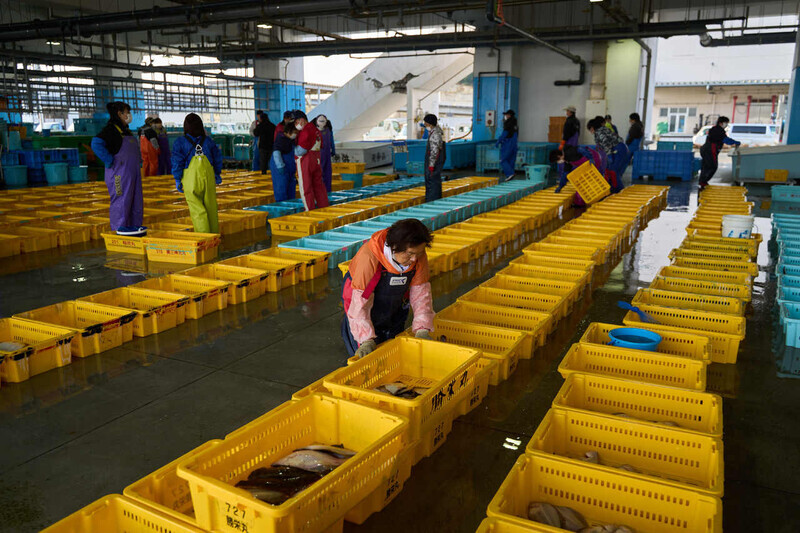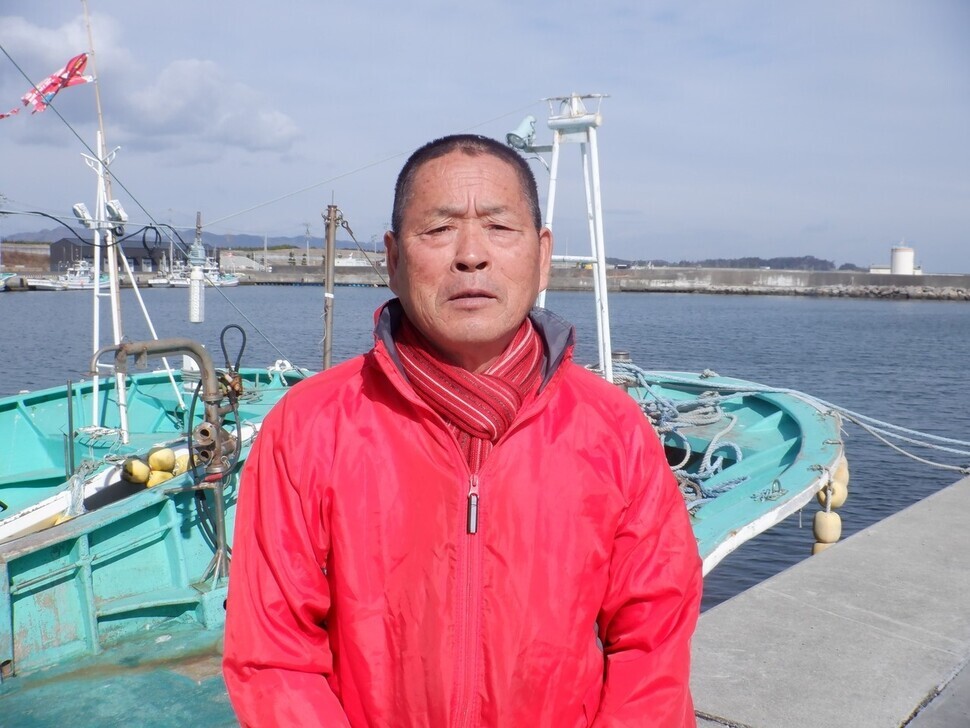hankyoreh
Links to other country sites 다른 나라 사이트 링크
[Interview] He’s fished in Fukushima waters for 56 years — now Japan wants to dump radioactive waste there

“Once they dump the contaminated water, it’s all over.”
This was the response of Haruo Ono, a fisher in Japan’s Fukushima Prefecture, to the government’s plan to release radioactively contaminated water into the sea this spring. Ono, who is 71 this year, had been catching fish in the sea for over a half-century — ever since he was 15 years old.
“After the contaminated water is released, who’s going to feed their children seafood from Fukushima?” he asked in exasperation. For people like him who make their living from fishing, the waters of Fukushima have been a workplace throughout their lives.
Already denounced by their neighbors as residents of a country that simply dumps its radioactive water into the ocean, they have been suffering an even greater fate at home.
“People cannot live without the sea. The sea is the source of life,” Ono stressed.
“I hope that not just Japan but our neighbors in Korea too will speak out against this contaminated water issue and protect our seas,” he urged.
This interview with him took place on March 14 through Tsunaki Ohara, a member of the editorial board at No Nukes News.
Tsunaki Ohara: What is your connection with the sea off Fukushima?
Haruo Ono: I live in Shinchi, a seaside village in northern Fukushima Prefecture. It’s about 50–60 kilometers away from the Fukushima Daiichi nuclear power plant. I have a boat, and I’m a member of the Soma Futaba Fisheries Cooperative in Fukushima Prefecture.
I’ve worked as a fisher since I was 15 years old. I’m 71 this year, so that’s a history dating back 56 years. My father and grandfather were fishers, and everyone in my family now is a fisher.
Ohara: How did things change after the March 2011 East Japan earthquake and nuclear power plant disaster 12 years ago?
Ono: Fishing activities were halted for a while after the Fukushima disaster. In June 2012, they started allowing test fishing for varieties of seafood that had been confirmed as safe. In April 2017, that got expanded to test fishing for all varieties apart from ones that were subject to shipping restrictions.
It was in 2020 that they really began expanding fishing once again. Fish hadn’t been selling because consumers were shunning products from Fukushima. The state’s radioactivity standard is 100 becquerels (Bq), but the Fukushima Prefecture Fisheries Cooperative set its own shipment standard of 50 Bq. Anything over that gets thrown out rather than sold.
Ohara: Were there any changes to the catch sizes or selling prices?
Ono: Catch sizes did drop a bit when the cooperative was subject to restrictions. Selling prices have recently recovered. I think the reason has to do with how thorough the fisheries cooperative has been about monitoring and sampling and how transparent about sharing the results, which the consumers appreciate.
Radioactivity levels have been close to zero, but there have been occasional high readings, such as a level of 85.5 Bq detected in sea bass last Feb. 7. In cases like those, shipments are suspended until that variety is verified to be safe.

Ohara: The Japanese government has decided to release radioactively contaminated water this year.
Ono: None of us fishers could understand that. This was a decision made unilaterally by politicians, the prime minister, and the Cabinet members. I thought Japan was a constitutional state. Do they really need to rush to dispose of it in the sea like this, without the permission of the people it affects?
Ohara: For fishers, this is a matter of survival.
Ono: The sea is a precious environment for us fishers. None of us wants to see the contamination of the environment we depend on. Who would welcome having trash dumped in front of their door?
And why do they think it’s OK to contaminate the water off of Fukushima? If [the water] is as safe as they claim, they should use it for farming. They should use it for kids’ swimming pools.
My understanding is that around 70%–80% of the Japanese public is opposed. By dumping the contaminated water in the sea, the government is going back on its pledge. Is that something a country’s prime minister should be doing? Prime Minister Kishida, I am also one of Japan’s citizens.
Ohara: What sort of measures has the government established in terms of compensation for losses?
Ono: This is not about money. They’ve talked about things like compensation for losses, but that is completely beside the point.
The sea is not some kind of property that human beings hold claim to. It’s the home of fishes and many other forms of life. Who are we to just willfully pollute that environment?
The creatures that live in the sea can’t speak for themselves. But as people who make our living catching those creatures, fishers know what kind of debt of gratitude we owe them.
Our work involves delivering those creatures to consumers — in the form of delicious seafood. Once they’ve dumped contaminated water into the sea, it’s too late for regrets.
Ohara: What alternatives do you envision?
Ono: They just need to stop rushing so fast to release the water in the ocean. I don’t understand why they’ve chosen the worst possible approach. We live in an era of scientific advancements — there must be some better way. If we don’t have it now, we will in a few years’ time.
I just have to ask why they’re in such a rush to dump the contaminated water when we still don’t know how the decommissioning of the Fukushima Daiichi nuclear power plant is going to get finished.
Ohara: I’m sure the other residents are quite unhappy too.
Ono: The electricity generated by Fukushima Daiichi ended up being used by people in Tokyo and its metropolitan area. It’s enough to have me thinking maybe the contaminated water ought to be dumped in Tokyo Bay instead.
Why does Fukushima keep bearing the brunt of everything? The ministers claim [the water] is safe — if it’s that safe, let’s see them drink it.
Ohara: What sort of losses do you foresee after the contaminated water has been released?
Ono: Once again, we won’t be able to sell our seafood. Who’s going to buy it? Would you feed your children seafood from Fukushima [after contaminated water has been released there]?
It makes sense that people would avoid Fukushima seafood compared with other regions. Once they dump the contaminated water, it’s all over.
Ohara: The other fishers must be very worried too.
Ono: The harm that tritium causes doesn’t go away after one or two years. If they continue dumping water over several years, the damage could be permanent.
Of course we’re worried. This has been physically and mentally difficult. It took 12 years for things to stabilize the way they did after the disaster.
What did we fishers do to deserve this? Why won’t they listen to us?
Ohara: What does this mean for your children’s generation?
Ono: My three sons are all fishers. That makes me even more worried. I’m worried about what it will mean for my children’s and grandchildren’s health if the ocean gets contaminated.
Ohara: It sounds like many people in Japan take this contaminated water release issue very seriously.
Ono: The dumping of this water isn’t just an issue for Fukushima. It affects Japan as a country.
It seems like some of the public thinks that it’s the state’s decision and there’s nothing to be done about it. The public needs to really understand this issue.
People living in seaside villages have long believed that there are spirits living in the sea. The sea is the source of life. People cannot live without the sea.
Our oceans are not a garbage can. I’d like to see the Japanese public speaking out together to protect the ocean.
Interview conducted by Tsunaki Ohara, editorial board member at No Nukes News; edited for clarity by Hong Seock-jae, staff reporter
Please direct questions or comments to [english@hani.co.kr]

Editorial・opinion
![[Column] Season 2 of special prosecutor probe may be coming to Korea soon [Column] Season 2 of special prosecutor probe may be coming to Korea soon](https://flexible.img.hani.co.kr/flexible/normal/500/300/imgdb/original/2024/0426/3317141030699447.jpg) [Column] Season 2 of special prosecutor probe may be coming to Korea soon
[Column] Season 2 of special prosecutor probe may be coming to Korea soon![[Column] Park Geun-hye déjà vu in Yoon Suk-yeol [Column] Park Geun-hye déjà vu in Yoon Suk-yeol](https://flexible.img.hani.co.kr/flexible/normal/500/300/imgdb/original/2024/0424/651713945113788.jpg) [Column] Park Geun-hye déjà vu in Yoon Suk-yeol
[Column] Park Geun-hye déjà vu in Yoon Suk-yeol- [Editorial] New weight of N. Korea’s nuclear threats makes dialogue all the more urgent
- [Guest essay] The real reason Korea’s new right wants to dub Rhee a founding father
- [Column] ‘Choson’: Is it time we start referring to N. Korea in its own terms?
- [Editorial] Japan’s rewriting of history with Korea has gone too far
- [Column] The president’s questionable capacity for dialogue
- [Column] Are chaebol firms just pizza pies for families to divvy up as they please?
- [Column] Has Korea, too, crossed the Rubicon on China?
- [Correspondent’s column] In Japan’s alliance with US, echoes of its past alliances with UK
Most viewed articles
- 1AI is catching up with humans at a ‘shocking’ rate
- 2‘We must say no’: Seoul defense chief on Korean, USFK involvement in hypothetical Taiwan crisis
- 3[Column] Season 2 of special prosecutor probe may be coming to Korea soon
- 4Division commander ordered troops to enter raging flood waters before Marine died, survivor says
- 5Is Japan about to snatch control of Line messenger from Korea’s Naver?
- 6Korea protests Japanese PM’s offering at war-linked Yasukuni Shrine
- 7Is N. Korea threatening to test nukes in response to possible new US-led sanctions body?
- 8[Guest essay] The real reason Korea’s new right wants to dub Rhee a founding father
- 9One Hyundai worker suffers through 16 piecemeal contracts in 23 months
- 10[Photo] Migrant workers rally for labor rights